Comprehensive Report: People Management Strategies in the NHS Context
VerifiedAdded on 2023/06/15
|9
|2677
|193
Report
AI Summary
This report provides an analysis of people management within the National Health Service (NHS), focusing on three key areas: leadership and management, training and development, and talent management underpinning performance management. It highlights the importance of effective people management in maintaining a positive working culture, increasing productivity, and improving brand image within the NHS. The report discusses relevant theoretical models such as contingency leadership style and X & Y management theory, and workplace learning. It offers recommendations for the NHS management regarding skills, knowledge, and behavior needed to deliver effectively in these areas, including adaptability, analytical and communication skills, and consultative behavior. The report concludes that effective people management is crucial for the NHS to achieve its objectives and deliver quality healthcare services.
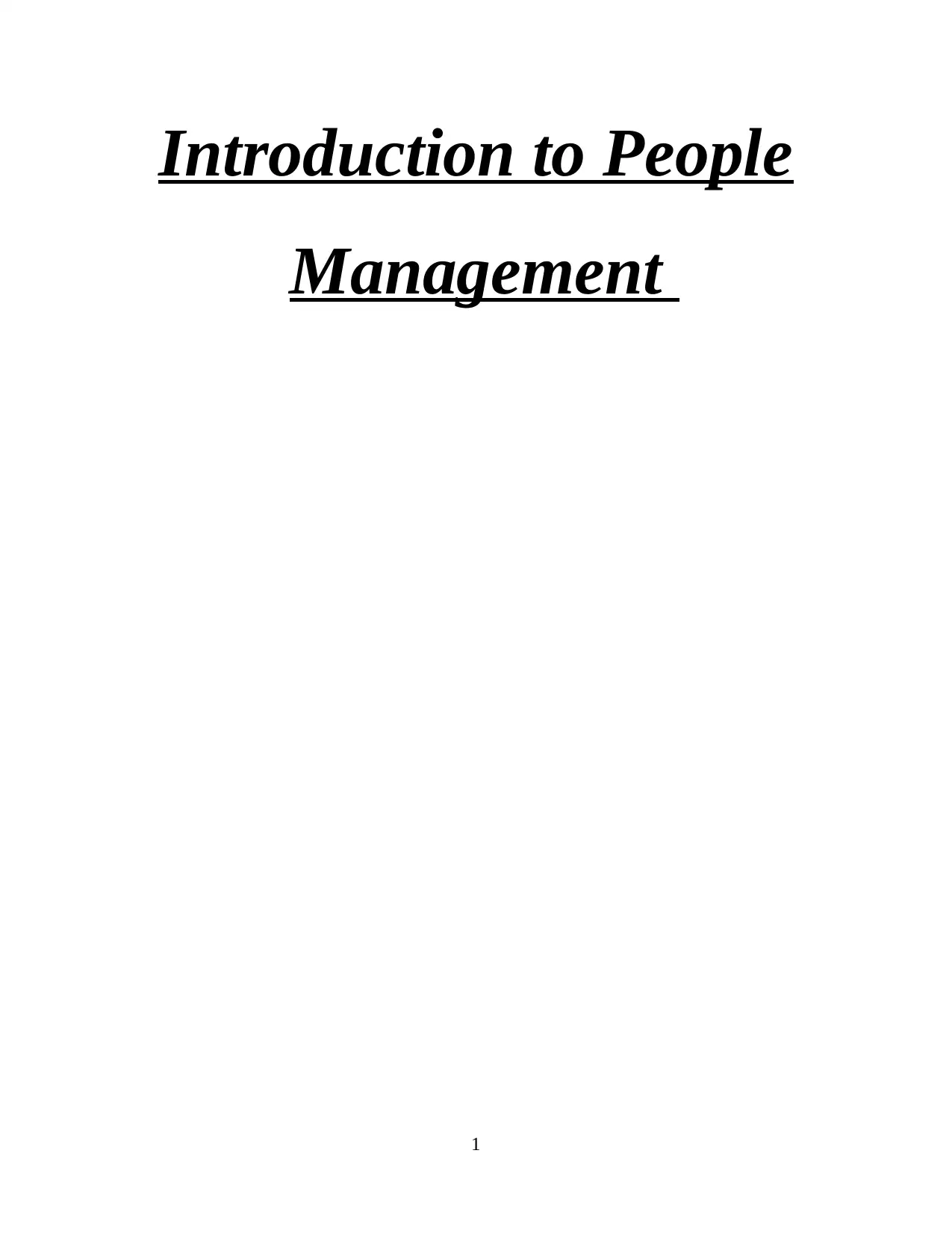
Introduction to People
Management
1
Management
1
Paraphrase This Document
Need a fresh take? Get an instant paraphrase of this document with our AI Paraphraser
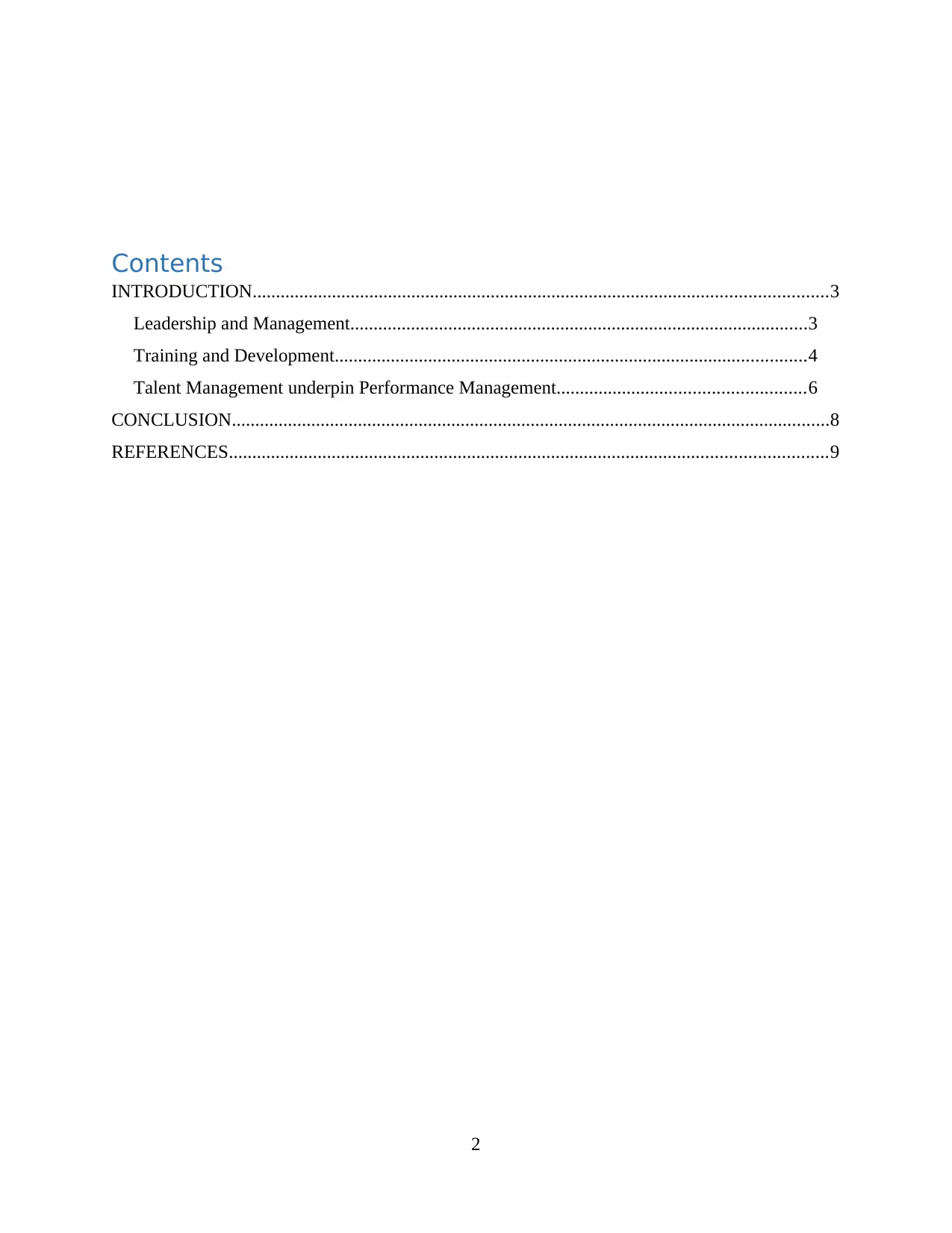
Contents
INTRODUCTION...........................................................................................................................3
Leadership and Management..................................................................................................3
Training and Development.....................................................................................................4
Talent Management underpin Performance Management.....................................................6
CONCLUSION................................................................................................................................8
REFERENCES................................................................................................................................9
2
INTRODUCTION...........................................................................................................................3
Leadership and Management..................................................................................................3
Training and Development.....................................................................................................4
Talent Management underpin Performance Management.....................................................6
CONCLUSION................................................................................................................................8
REFERENCES................................................................................................................................9
2
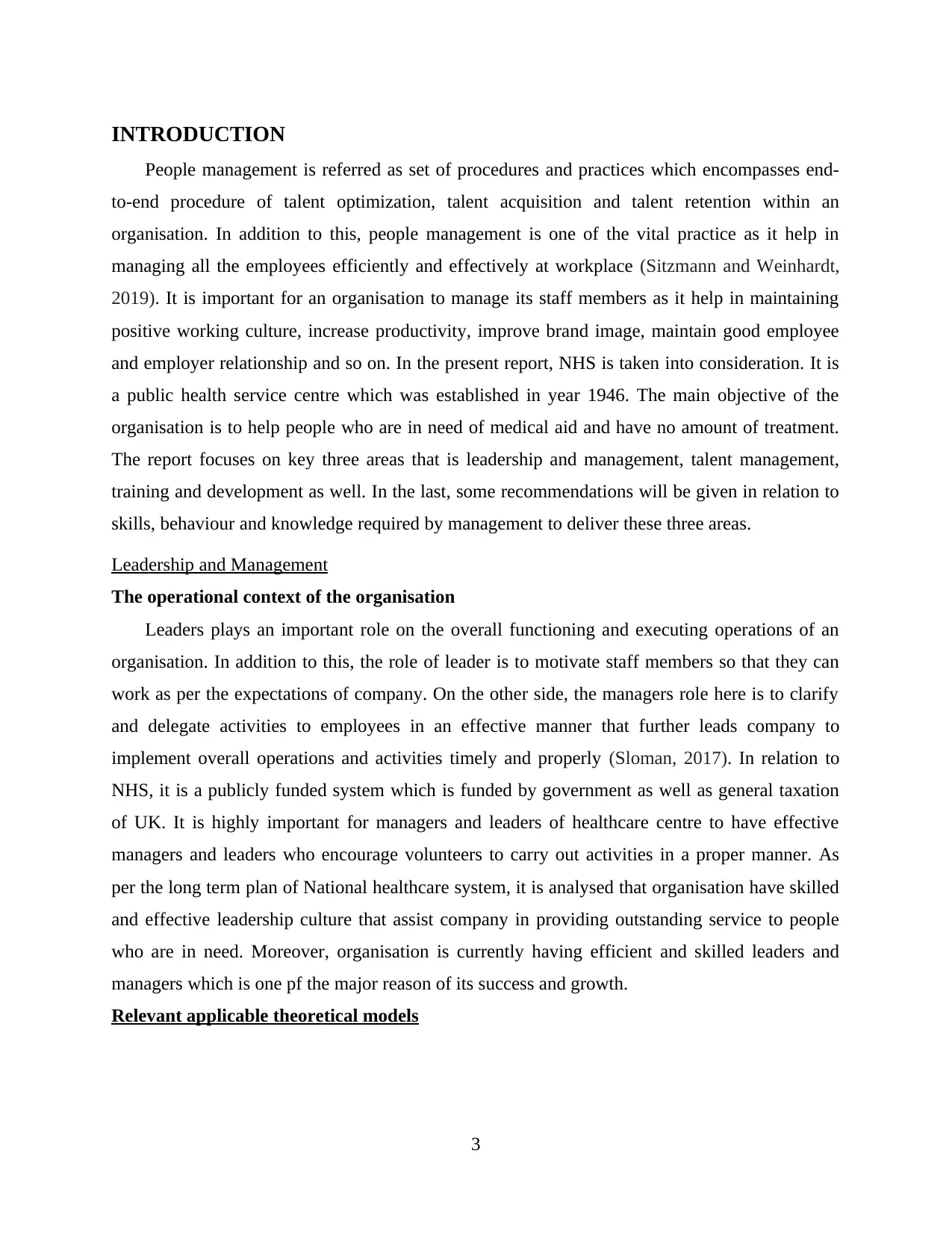
INTRODUCTION
People management is referred as set of procedures and practices which encompasses end-
to-end procedure of talent optimization, talent acquisition and talent retention within an
organisation. In addition to this, people management is one of the vital practice as it help in
managing all the employees efficiently and effectively at workplace (Sitzmann and Weinhardt,
2019). It is important for an organisation to manage its staff members as it help in maintaining
positive working culture, increase productivity, improve brand image, maintain good employee
and employer relationship and so on. In the present report, NHS is taken into consideration. It is
a public health service centre which was established in year 1946. The main objective of the
organisation is to help people who are in need of medical aid and have no amount of treatment.
The report focuses on key three areas that is leadership and management, talent management,
training and development as well. In the last, some recommendations will be given in relation to
skills, behaviour and knowledge required by management to deliver these three areas.
Leadership and Management
The operational context of the organisation
Leaders plays an important role on the overall functioning and executing operations of an
organisation. In addition to this, the role of leader is to motivate staff members so that they can
work as per the expectations of company. On the other side, the managers role here is to clarify
and delegate activities to employees in an effective manner that further leads company to
implement overall operations and activities timely and properly (Sloman, 2017). In relation to
NHS, it is a publicly funded system which is funded by government as well as general taxation
of UK. It is highly important for managers and leaders of healthcare centre to have effective
managers and leaders who encourage volunteers to carry out activities in a proper manner. As
per the long term plan of National healthcare system, it is analysed that organisation have skilled
and effective leadership culture that assist company in providing outstanding service to people
who are in need. Moreover, organisation is currently having efficient and skilled leaders and
managers which is one pf the major reason of its success and growth.
Relevant applicable theoretical models
3
People management is referred as set of procedures and practices which encompasses end-
to-end procedure of talent optimization, talent acquisition and talent retention within an
organisation. In addition to this, people management is one of the vital practice as it help in
managing all the employees efficiently and effectively at workplace (Sitzmann and Weinhardt,
2019). It is important for an organisation to manage its staff members as it help in maintaining
positive working culture, increase productivity, improve brand image, maintain good employee
and employer relationship and so on. In the present report, NHS is taken into consideration. It is
a public health service centre which was established in year 1946. The main objective of the
organisation is to help people who are in need of medical aid and have no amount of treatment.
The report focuses on key three areas that is leadership and management, talent management,
training and development as well. In the last, some recommendations will be given in relation to
skills, behaviour and knowledge required by management to deliver these three areas.
Leadership and Management
The operational context of the organisation
Leaders plays an important role on the overall functioning and executing operations of an
organisation. In addition to this, the role of leader is to motivate staff members so that they can
work as per the expectations of company. On the other side, the managers role here is to clarify
and delegate activities to employees in an effective manner that further leads company to
implement overall operations and activities timely and properly (Sloman, 2017). In relation to
NHS, it is a publicly funded system which is funded by government as well as general taxation
of UK. It is highly important for managers and leaders of healthcare centre to have effective
managers and leaders who encourage volunteers to carry out activities in a proper manner. As
per the long term plan of National healthcare system, it is analysed that organisation have skilled
and effective leadership culture that assist company in providing outstanding service to people
who are in need. Moreover, organisation is currently having efficient and skilled leaders and
managers which is one pf the major reason of its success and growth.
Relevant applicable theoretical models
3
⊘ This is a preview!⊘
Do you want full access?
Subscribe today to unlock all pages.

Trusted by 1+ million students worldwide
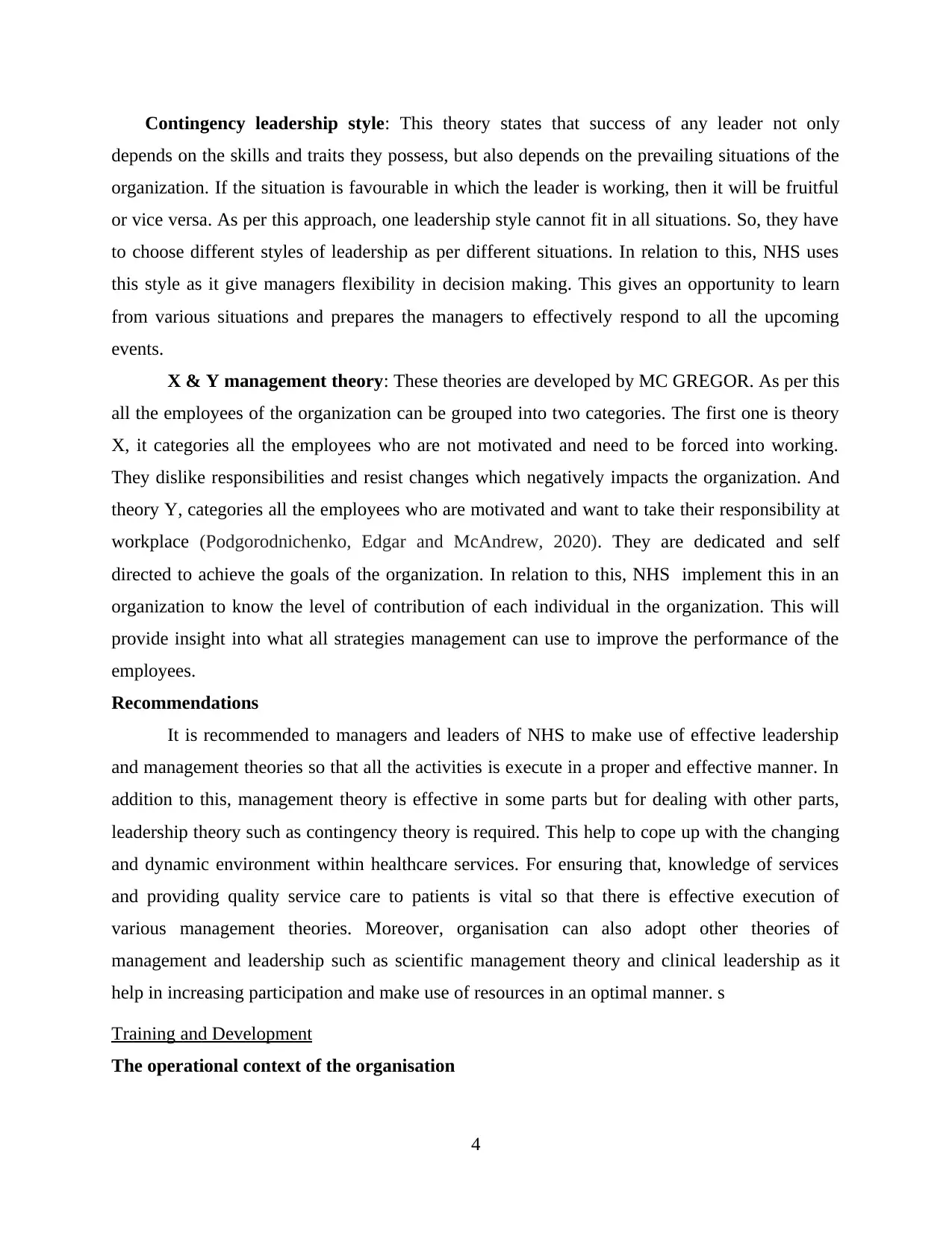
Contingency leadership style: This theory states that success of any leader not only
depends on the skills and traits they possess, but also depends on the prevailing situations of the
organization. If the situation is favourable in which the leader is working, then it will be fruitful
or vice versa. As per this approach, one leadership style cannot fit in all situations. So, they have
to choose different styles of leadership as per different situations. In relation to this, NHS uses
this style as it give managers flexibility in decision making. This gives an opportunity to learn
from various situations and prepares the managers to effectively respond to all the upcoming
events.
X & Y management theory: These theories are developed by MC GREGOR. As per this
all the employees of the organization can be grouped into two categories. The first one is theory
X, it categories all the employees who are not motivated and need to be forced into working.
They dislike responsibilities and resist changes which negatively impacts the organization. And
theory Y, categories all the employees who are motivated and want to take their responsibility at
workplace (Podgorodnichenko, Edgar and McAndrew, 2020). They are dedicated and self
directed to achieve the goals of the organization. In relation to this, NHS implement this in an
organization to know the level of contribution of each individual in the organization. This will
provide insight into what all strategies management can use to improve the performance of the
employees.
Recommendations
It is recommended to managers and leaders of NHS to make use of effective leadership
and management theories so that all the activities is execute in a proper and effective manner. In
addition to this, management theory is effective in some parts but for dealing with other parts,
leadership theory such as contingency theory is required. This help to cope up with the changing
and dynamic environment within healthcare services. For ensuring that, knowledge of services
and providing quality service care to patients is vital so that there is effective execution of
various management theories. Moreover, organisation can also adopt other theories of
management and leadership such as scientific management theory and clinical leadership as it
help in increasing participation and make use of resources in an optimal manner. s
Training and Development
The operational context of the organisation
4
depends on the skills and traits they possess, but also depends on the prevailing situations of the
organization. If the situation is favourable in which the leader is working, then it will be fruitful
or vice versa. As per this approach, one leadership style cannot fit in all situations. So, they have
to choose different styles of leadership as per different situations. In relation to this, NHS uses
this style as it give managers flexibility in decision making. This gives an opportunity to learn
from various situations and prepares the managers to effectively respond to all the upcoming
events.
X & Y management theory: These theories are developed by MC GREGOR. As per this
all the employees of the organization can be grouped into two categories. The first one is theory
X, it categories all the employees who are not motivated and need to be forced into working.
They dislike responsibilities and resist changes which negatively impacts the organization. And
theory Y, categories all the employees who are motivated and want to take their responsibility at
workplace (Podgorodnichenko, Edgar and McAndrew, 2020). They are dedicated and self
directed to achieve the goals of the organization. In relation to this, NHS implement this in an
organization to know the level of contribution of each individual in the organization. This will
provide insight into what all strategies management can use to improve the performance of the
employees.
Recommendations
It is recommended to managers and leaders of NHS to make use of effective leadership
and management theories so that all the activities is execute in a proper and effective manner. In
addition to this, management theory is effective in some parts but for dealing with other parts,
leadership theory such as contingency theory is required. This help to cope up with the changing
and dynamic environment within healthcare services. For ensuring that, knowledge of services
and providing quality service care to patients is vital so that there is effective execution of
various management theories. Moreover, organisation can also adopt other theories of
management and leadership such as scientific management theory and clinical leadership as it
help in increasing participation and make use of resources in an optimal manner. s
Training and Development
The operational context of the organisation
4
Paraphrase This Document
Need a fresh take? Get an instant paraphrase of this document with our AI Paraphraser
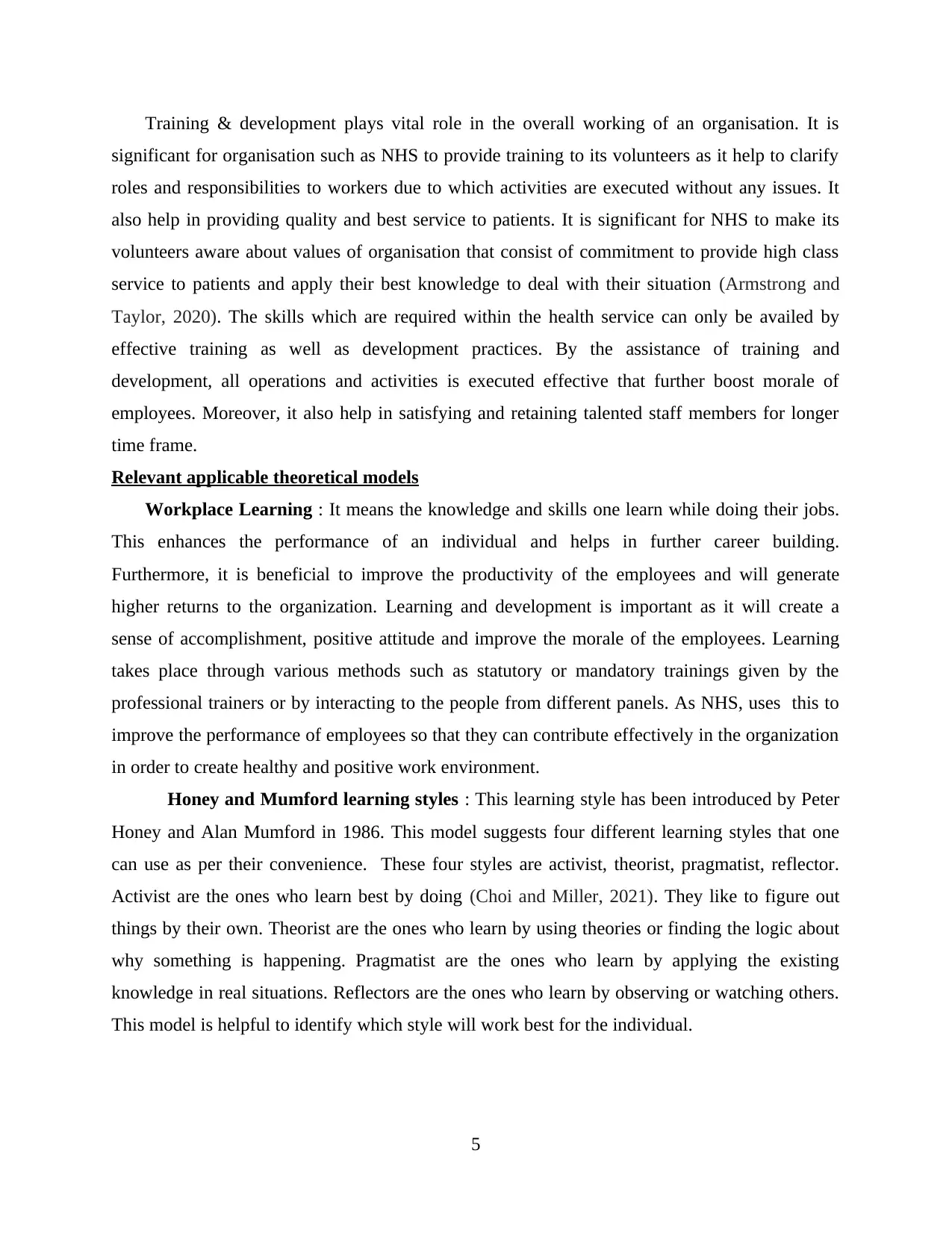
Training & development plays vital role in the overall working of an organisation. It is
significant for organisation such as NHS to provide training to its volunteers as it help to clarify
roles and responsibilities to workers due to which activities are executed without any issues. It
also help in providing quality and best service to patients. It is significant for NHS to make its
volunteers aware about values of organisation that consist of commitment to provide high class
service to patients and apply their best knowledge to deal with their situation (Armstrong and
Taylor, 2020). The skills which are required within the health service can only be availed by
effective training as well as development practices. By the assistance of training and
development, all operations and activities is executed effective that further boost morale of
employees. Moreover, it also help in satisfying and retaining talented staff members for longer
time frame.
Relevant applicable theoretical models
Workplace Learning : It means the knowledge and skills one learn while doing their jobs.
This enhances the performance of an individual and helps in further career building.
Furthermore, it is beneficial to improve the productivity of the employees and will generate
higher returns to the organization. Learning and development is important as it will create a
sense of accomplishment, positive attitude and improve the morale of the employees. Learning
takes place through various methods such as statutory or mandatory trainings given by the
professional trainers or by interacting to the people from different panels. As NHS, uses this to
improve the performance of employees so that they can contribute effectively in the organization
in order to create healthy and positive work environment.
Honey and Mumford learning styles : This learning style has been introduced by Peter
Honey and Alan Mumford in 1986. This model suggests four different learning styles that one
can use as per their convenience. These four styles are activist, theorist, pragmatist, reflector.
Activist are the ones who learn best by doing (Choi and Miller, 2021). They like to figure out
things by their own. Theorist are the ones who learn by using theories or finding the logic about
why something is happening. Pragmatist are the ones who learn by applying the existing
knowledge in real situations. Reflectors are the ones who learn by observing or watching others.
This model is helpful to identify which style will work best for the individual.
5
significant for organisation such as NHS to provide training to its volunteers as it help to clarify
roles and responsibilities to workers due to which activities are executed without any issues. It
also help in providing quality and best service to patients. It is significant for NHS to make its
volunteers aware about values of organisation that consist of commitment to provide high class
service to patients and apply their best knowledge to deal with their situation (Armstrong and
Taylor, 2020). The skills which are required within the health service can only be availed by
effective training as well as development practices. By the assistance of training and
development, all operations and activities is executed effective that further boost morale of
employees. Moreover, it also help in satisfying and retaining talented staff members for longer
time frame.
Relevant applicable theoretical models
Workplace Learning : It means the knowledge and skills one learn while doing their jobs.
This enhances the performance of an individual and helps in further career building.
Furthermore, it is beneficial to improve the productivity of the employees and will generate
higher returns to the organization. Learning and development is important as it will create a
sense of accomplishment, positive attitude and improve the morale of the employees. Learning
takes place through various methods such as statutory or mandatory trainings given by the
professional trainers or by interacting to the people from different panels. As NHS, uses this to
improve the performance of employees so that they can contribute effectively in the organization
in order to create healthy and positive work environment.
Honey and Mumford learning styles : This learning style has been introduced by Peter
Honey and Alan Mumford in 1986. This model suggests four different learning styles that one
can use as per their convenience. These four styles are activist, theorist, pragmatist, reflector.
Activist are the ones who learn best by doing (Choi and Miller, 2021). They like to figure out
things by their own. Theorist are the ones who learn by using theories or finding the logic about
why something is happening. Pragmatist are the ones who learn by applying the existing
knowledge in real situations. Reflectors are the ones who learn by observing or watching others.
This model is helpful to identify which style will work best for the individual.
5
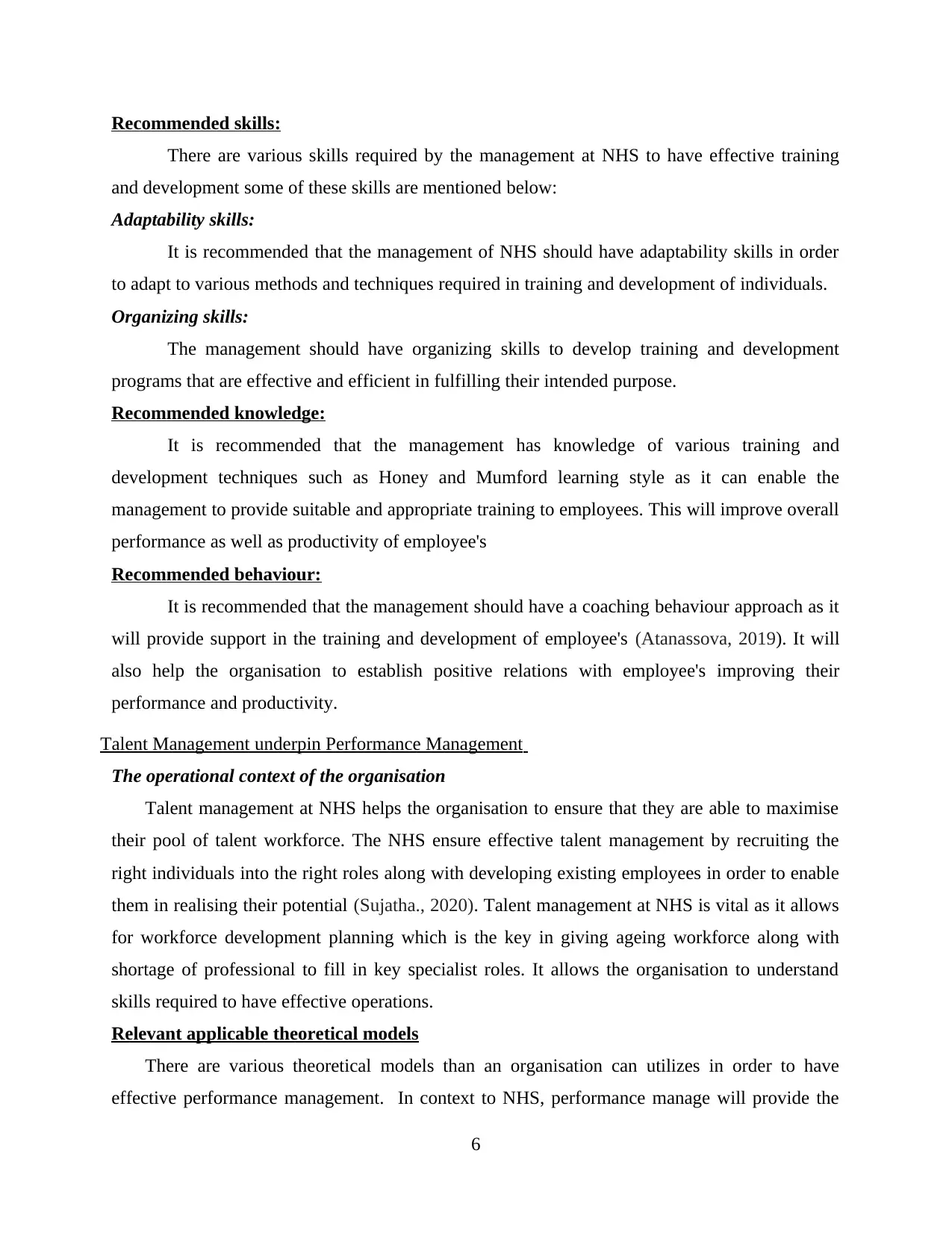
Recommended skills:
There are various skills required by the management at NHS to have effective training
and development some of these skills are mentioned below:
Adaptability skills:
It is recommended that the management of NHS should have adaptability skills in order
to adapt to various methods and techniques required in training and development of individuals.
Organizing skills:
The management should have organizing skills to develop training and development
programs that are effective and efficient in fulfilling their intended purpose.
Recommended knowledge:
It is recommended that the management has knowledge of various training and
development techniques such as Honey and Mumford learning style as it can enable the
management to provide suitable and appropriate training to employees. This will improve overall
performance as well as productivity of employee's
Recommended behaviour:
It is recommended that the management should have a coaching behaviour approach as it
will provide support in the training and development of employee's (Atanassova, 2019). It will
also help the organisation to establish positive relations with employee's improving their
performance and productivity.
Talent Management underpin Performance Management
The operational context of the organisation
Talent management at NHS helps the organisation to ensure that they are able to maximise
their pool of talent workforce. The NHS ensure effective talent management by recruiting the
right individuals into the right roles along with developing existing employees in order to enable
them in realising their potential (Sujatha., 2020). Talent management at NHS is vital as it allows
for workforce development planning which is the key in giving ageing workforce along with
shortage of professional to fill in key specialist roles. It allows the organisation to understand
skills required to have effective operations.
Relevant applicable theoretical models
There are various theoretical models than an organisation can utilizes in order to have
effective performance management. In context to NHS, performance manage will provide the
6
There are various skills required by the management at NHS to have effective training
and development some of these skills are mentioned below:
Adaptability skills:
It is recommended that the management of NHS should have adaptability skills in order
to adapt to various methods and techniques required in training and development of individuals.
Organizing skills:
The management should have organizing skills to develop training and development
programs that are effective and efficient in fulfilling their intended purpose.
Recommended knowledge:
It is recommended that the management has knowledge of various training and
development techniques such as Honey and Mumford learning style as it can enable the
management to provide suitable and appropriate training to employees. This will improve overall
performance as well as productivity of employee's
Recommended behaviour:
It is recommended that the management should have a coaching behaviour approach as it
will provide support in the training and development of employee's (Atanassova, 2019). It will
also help the organisation to establish positive relations with employee's improving their
performance and productivity.
Talent Management underpin Performance Management
The operational context of the organisation
Talent management at NHS helps the organisation to ensure that they are able to maximise
their pool of talent workforce. The NHS ensure effective talent management by recruiting the
right individuals into the right roles along with developing existing employees in order to enable
them in realising their potential (Sujatha., 2020). Talent management at NHS is vital as it allows
for workforce development planning which is the key in giving ageing workforce along with
shortage of professional to fill in key specialist roles. It allows the organisation to understand
skills required to have effective operations.
Relevant applicable theoretical models
There are various theoretical models than an organisation can utilizes in order to have
effective performance management. In context to NHS, performance manage will provide the
6
⊘ This is a preview!⊘
Do you want full access?
Subscribe today to unlock all pages.

Trusted by 1+ million students worldwide
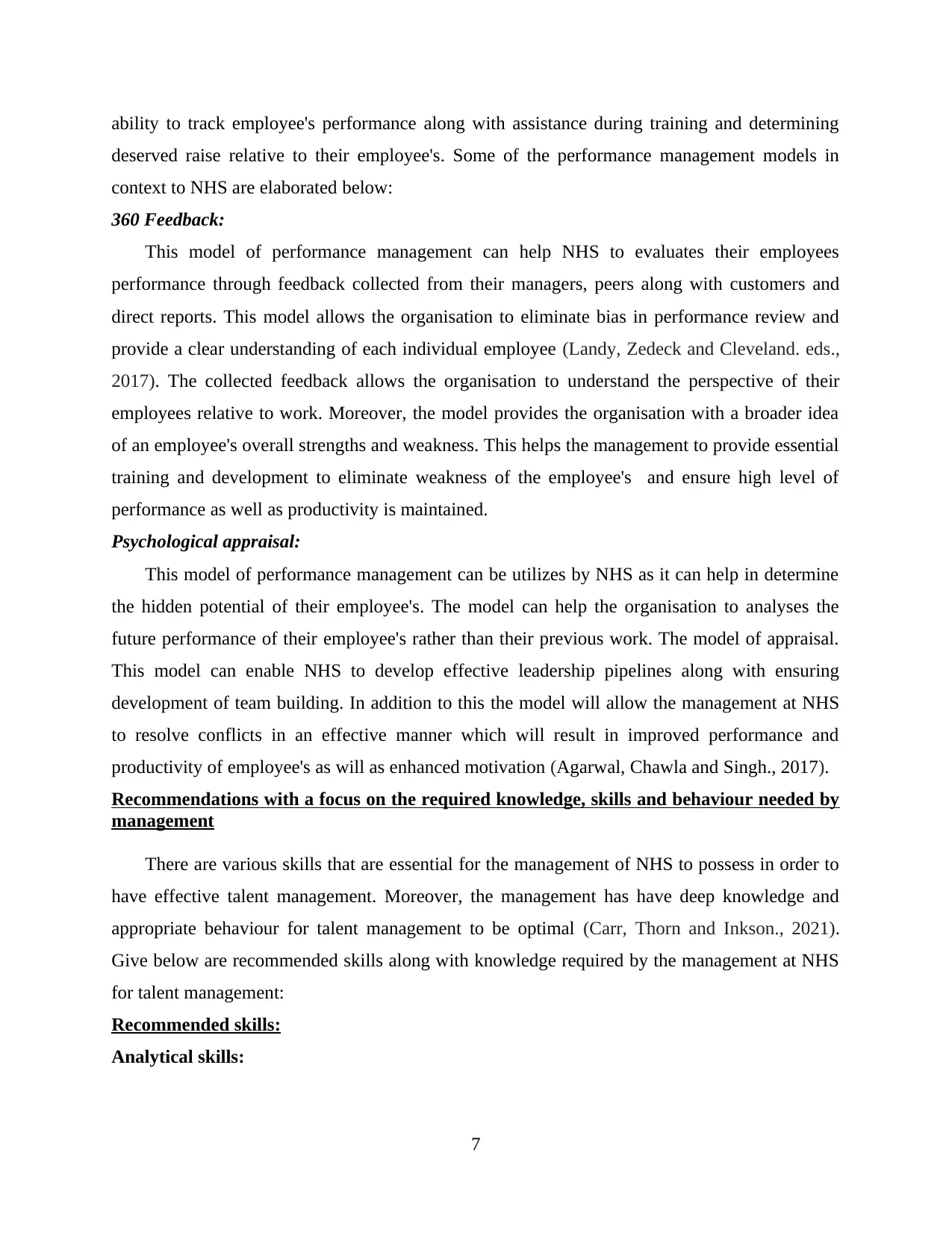
ability to track employee's performance along with assistance during training and determining
deserved raise relative to their employee's. Some of the performance management models in
context to NHS are elaborated below:
360 Feedback:
This model of performance management can help NHS to evaluates their employees
performance through feedback collected from their managers, peers along with customers and
direct reports. This model allows the organisation to eliminate bias in performance review and
provide a clear understanding of each individual employee (Landy, Zedeck and Cleveland. eds.,
2017). The collected feedback allows the organisation to understand the perspective of their
employees relative to work. Moreover, the model provides the organisation with a broader idea
of an employee's overall strengths and weakness. This helps the management to provide essential
training and development to eliminate weakness of the employee's and ensure high level of
performance as well as productivity is maintained.
Psychological appraisal:
This model of performance management can be utilizes by NHS as it can help in determine
the hidden potential of their employee's. The model can help the organisation to analyses the
future performance of their employee's rather than their previous work. The model of appraisal.
This model can enable NHS to develop effective leadership pipelines along with ensuring
development of team building. In addition to this the model will allow the management at NHS
to resolve conflicts in an effective manner which will result in improved performance and
productivity of employee's as will as enhanced motivation (Agarwal, Chawla and Singh., 2017).
Recommendations with a focus on the required knowledge, skills and behaviour needed by
management
There are various skills that are essential for the management of NHS to possess in order to
have effective talent management. Moreover, the management has have deep knowledge and
appropriate behaviour for talent management to be optimal (Carr, Thorn and Inkson., 2021).
Give below are recommended skills along with knowledge required by the management at NHS
for talent management:
Recommended skills:
Analytical skills:
7
deserved raise relative to their employee's. Some of the performance management models in
context to NHS are elaborated below:
360 Feedback:
This model of performance management can help NHS to evaluates their employees
performance through feedback collected from their managers, peers along with customers and
direct reports. This model allows the organisation to eliminate bias in performance review and
provide a clear understanding of each individual employee (Landy, Zedeck and Cleveland. eds.,
2017). The collected feedback allows the organisation to understand the perspective of their
employees relative to work. Moreover, the model provides the organisation with a broader idea
of an employee's overall strengths and weakness. This helps the management to provide essential
training and development to eliminate weakness of the employee's and ensure high level of
performance as well as productivity is maintained.
Psychological appraisal:
This model of performance management can be utilizes by NHS as it can help in determine
the hidden potential of their employee's. The model can help the organisation to analyses the
future performance of their employee's rather than their previous work. The model of appraisal.
This model can enable NHS to develop effective leadership pipelines along with ensuring
development of team building. In addition to this the model will allow the management at NHS
to resolve conflicts in an effective manner which will result in improved performance and
productivity of employee's as will as enhanced motivation (Agarwal, Chawla and Singh., 2017).
Recommendations with a focus on the required knowledge, skills and behaviour needed by
management
There are various skills that are essential for the management of NHS to possess in order to
have effective talent management. Moreover, the management has have deep knowledge and
appropriate behaviour for talent management to be optimal (Carr, Thorn and Inkson., 2021).
Give below are recommended skills along with knowledge required by the management at NHS
for talent management:
Recommended skills:
Analytical skills:
7
Paraphrase This Document
Need a fresh take? Get an instant paraphrase of this document with our AI Paraphraser
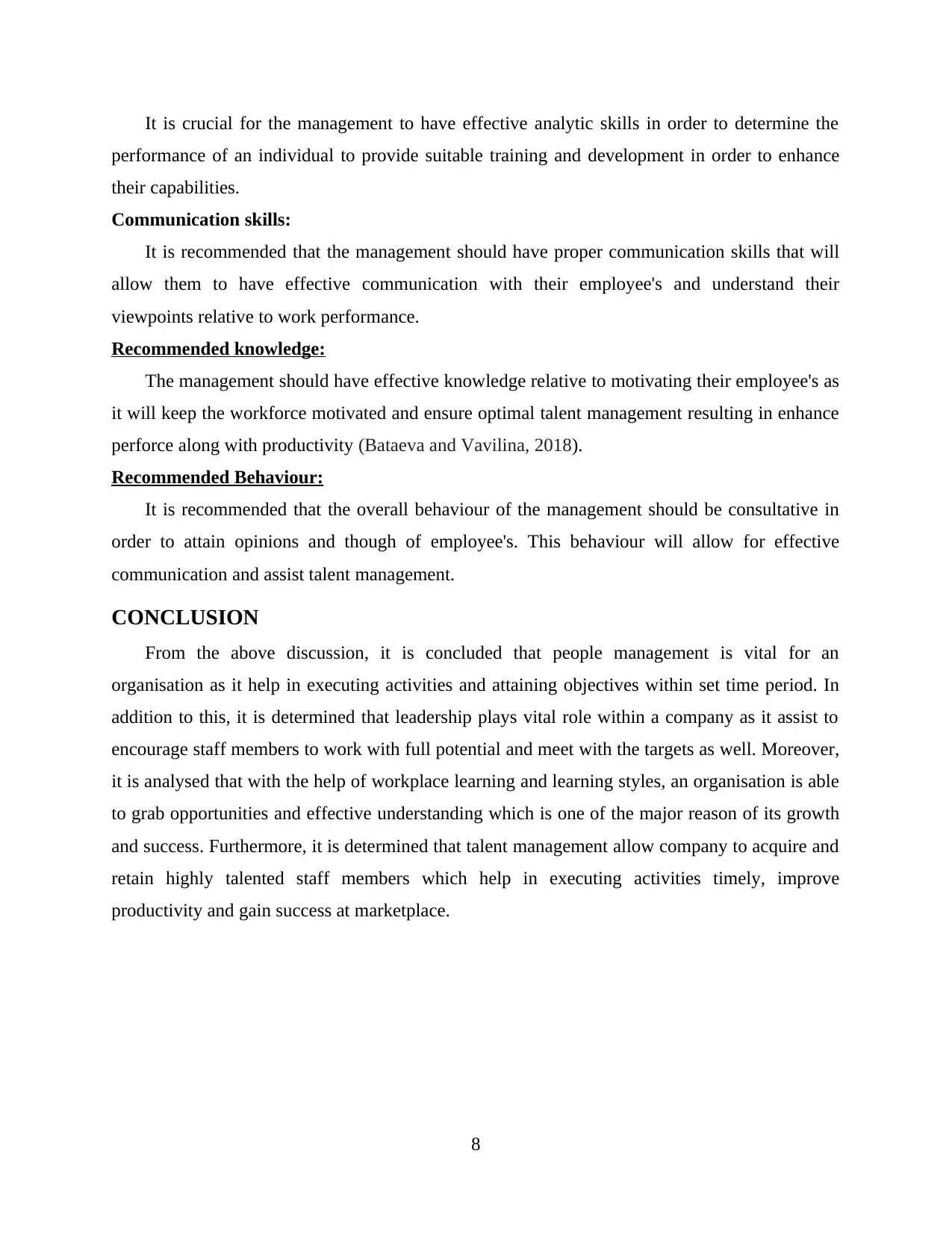
It is crucial for the management to have effective analytic skills in order to determine the
performance of an individual to provide suitable training and development in order to enhance
their capabilities.
Communication skills:
It is recommended that the management should have proper communication skills that will
allow them to have effective communication with their employee's and understand their
viewpoints relative to work performance.
Recommended knowledge:
The management should have effective knowledge relative to motivating their employee's as
it will keep the workforce motivated and ensure optimal talent management resulting in enhance
perforce along with productivity (Bataeva and Vavilina, 2018).
Recommended Behaviour:
It is recommended that the overall behaviour of the management should be consultative in
order to attain opinions and though of employee's. This behaviour will allow for effective
communication and assist talent management.
CONCLUSION
From the above discussion, it is concluded that people management is vital for an
organisation as it help in executing activities and attaining objectives within set time period. In
addition to this, it is determined that leadership plays vital role within a company as it assist to
encourage staff members to work with full potential and meet with the targets as well. Moreover,
it is analysed that with the help of workplace learning and learning styles, an organisation is able
to grab opportunities and effective understanding which is one of the major reason of its growth
and success. Furthermore, it is determined that talent management allow company to acquire and
retain highly talented staff members which help in executing activities timely, improve
productivity and gain success at marketplace.
8
performance of an individual to provide suitable training and development in order to enhance
their capabilities.
Communication skills:
It is recommended that the management should have proper communication skills that will
allow them to have effective communication with their employee's and understand their
viewpoints relative to work performance.
Recommended knowledge:
The management should have effective knowledge relative to motivating their employee's as
it will keep the workforce motivated and ensure optimal talent management resulting in enhance
perforce along with productivity (Bataeva and Vavilina, 2018).
Recommended Behaviour:
It is recommended that the overall behaviour of the management should be consultative in
order to attain opinions and though of employee's. This behaviour will allow for effective
communication and assist talent management.
CONCLUSION
From the above discussion, it is concluded that people management is vital for an
organisation as it help in executing activities and attaining objectives within set time period. In
addition to this, it is determined that leadership plays vital role within a company as it assist to
encourage staff members to work with full potential and meet with the targets as well. Moreover,
it is analysed that with the help of workplace learning and learning styles, an organisation is able
to grab opportunities and effective understanding which is one of the major reason of its growth
and success. Furthermore, it is determined that talent management allow company to acquire and
retain highly talented staff members which help in executing activities timely, improve
productivity and gain success at marketplace.
8
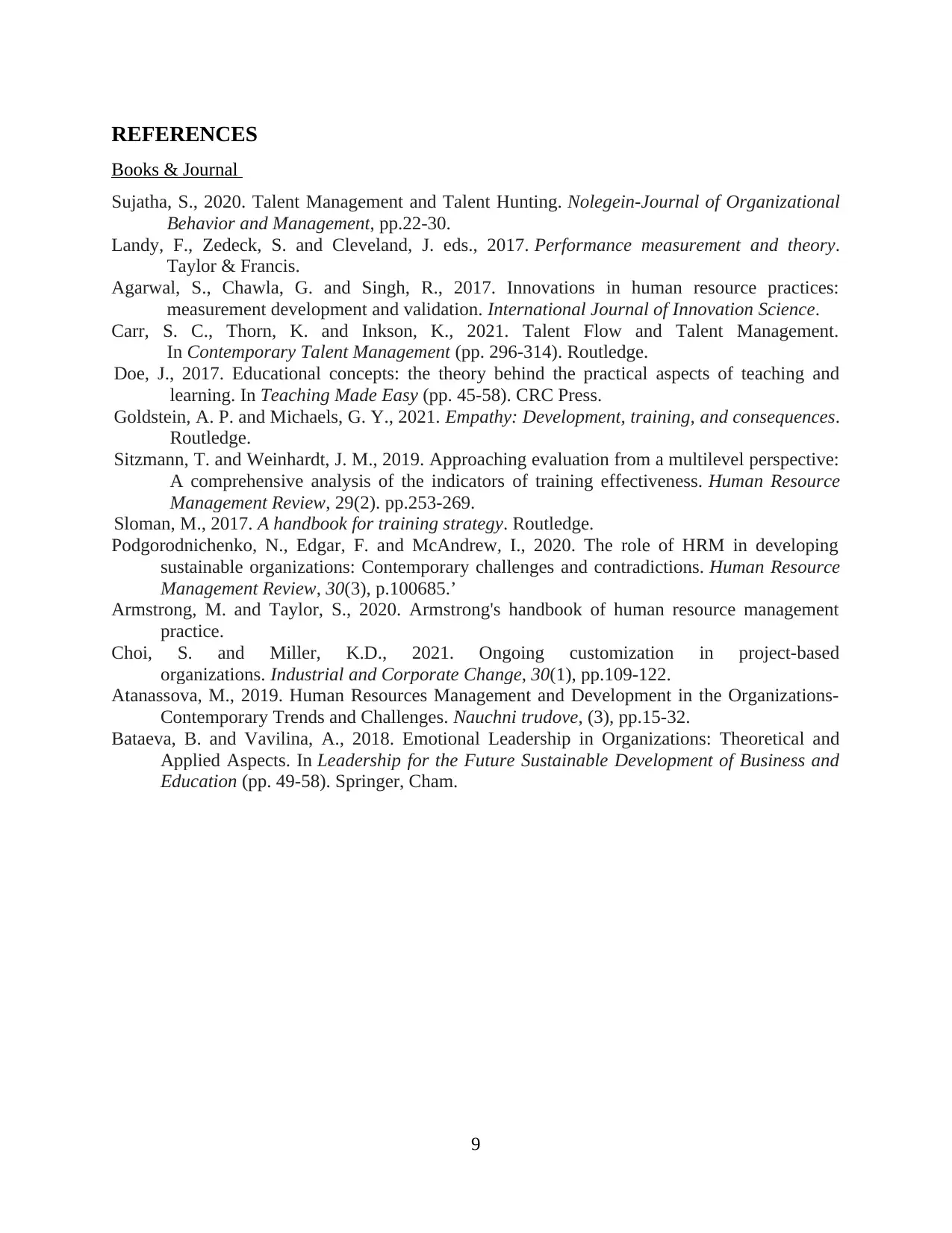
REFERENCES
Books & Journal
Sujatha, S., 2020. Talent Management and Talent Hunting. Nolegein-Journal of Organizational
Behavior and Management, pp.22-30.
Landy, F., Zedeck, S. and Cleveland, J. eds., 2017. Performance measurement and theory.
Taylor & Francis.
Agarwal, S., Chawla, G. and Singh, R., 2017. Innovations in human resource practices:
measurement development and validation. International Journal of Innovation Science.
Carr, S. C., Thorn, K. and Inkson, K., 2021. Talent Flow and Talent Management.
In Contemporary Talent Management (pp. 296-314). Routledge.
Doe, J., 2017. Educational concepts: the theory behind the practical aspects of teaching and
learning. In Teaching Made Easy (pp. 45-58). CRC Press.
Goldstein, A. P. and Michaels, G. Y., 2021. Empathy: Development, training, and consequences.
Routledge.
Sitzmann, T. and Weinhardt, J. M., 2019. Approaching evaluation from a multilevel perspective:
A comprehensive analysis of the indicators of training effectiveness. Human Resource
Management Review, 29(2). pp.253-269.
Sloman, M., 2017. A handbook for training strategy. Routledge.
Podgorodnichenko, N., Edgar, F. and McAndrew, I., 2020. The role of HRM in developing
sustainable organizations: Contemporary challenges and contradictions. Human Resource
Management Review, 30(3), p.100685.’
Armstrong, M. and Taylor, S., 2020. Armstrong's handbook of human resource management
practice.
Choi, S. and Miller, K.D., 2021. Ongoing customization in project-based
organizations. Industrial and Corporate Change, 30(1), pp.109-122.
Atanassova, M., 2019. Human Resources Management and Development in the Organizations-
Contemporary Trends and Challenges. Nauchni trudove, (3), pp.15-32.
Bataeva, B. and Vavilina, A., 2018. Emotional Leadership in Organizations: Theoretical and
Applied Aspects. In Leadership for the Future Sustainable Development of Business and
Education (pp. 49-58). Springer, Cham.
9
Books & Journal
Sujatha, S., 2020. Talent Management and Talent Hunting. Nolegein-Journal of Organizational
Behavior and Management, pp.22-30.
Landy, F., Zedeck, S. and Cleveland, J. eds., 2017. Performance measurement and theory.
Taylor & Francis.
Agarwal, S., Chawla, G. and Singh, R., 2017. Innovations in human resource practices:
measurement development and validation. International Journal of Innovation Science.
Carr, S. C., Thorn, K. and Inkson, K., 2021. Talent Flow and Talent Management.
In Contemporary Talent Management (pp. 296-314). Routledge.
Doe, J., 2017. Educational concepts: the theory behind the practical aspects of teaching and
learning. In Teaching Made Easy (pp. 45-58). CRC Press.
Goldstein, A. P. and Michaels, G. Y., 2021. Empathy: Development, training, and consequences.
Routledge.
Sitzmann, T. and Weinhardt, J. M., 2019. Approaching evaluation from a multilevel perspective:
A comprehensive analysis of the indicators of training effectiveness. Human Resource
Management Review, 29(2). pp.253-269.
Sloman, M., 2017. A handbook for training strategy. Routledge.
Podgorodnichenko, N., Edgar, F. and McAndrew, I., 2020. The role of HRM in developing
sustainable organizations: Contemporary challenges and contradictions. Human Resource
Management Review, 30(3), p.100685.’
Armstrong, M. and Taylor, S., 2020. Armstrong's handbook of human resource management
practice.
Choi, S. and Miller, K.D., 2021. Ongoing customization in project-based
organizations. Industrial and Corporate Change, 30(1), pp.109-122.
Atanassova, M., 2019. Human Resources Management and Development in the Organizations-
Contemporary Trends and Challenges. Nauchni trudove, (3), pp.15-32.
Bataeva, B. and Vavilina, A., 2018. Emotional Leadership in Organizations: Theoretical and
Applied Aspects. In Leadership for the Future Sustainable Development of Business and
Education (pp. 49-58). Springer, Cham.
9
⊘ This is a preview!⊘
Do you want full access?
Subscribe today to unlock all pages.

Trusted by 1+ million students worldwide
1 out of 9
Related Documents
Your All-in-One AI-Powered Toolkit for Academic Success.
+13062052269
info@desklib.com
Available 24*7 on WhatsApp / Email
![[object Object]](/_next/static/media/star-bottom.7253800d.svg)
Unlock your academic potential
Copyright © 2020–2026 A2Z Services. All Rights Reserved. Developed and managed by ZUCOL.




